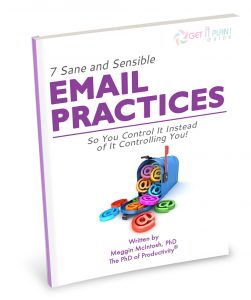Controlling Voice Mail by Judith Ann Kirk
 Voice mail is a valuable, timesaving communication tool. When you are involved in a project or in a relaxation mode, the ringing of a telephone can be an annoying interruption. If you regard voice mail as a personal assistant, you will reap the benefits from successfully gathering or leaving information. However, it is not so much the tool that enhances productivity, but how well you use it. Try a few of these tips to get you started in effectively and efficiently using the voice mail device.
Voice mail is a valuable, timesaving communication tool. When you are involved in a project or in a relaxation mode, the ringing of a telephone can be an annoying interruption. If you regard voice mail as a personal assistant, you will reap the benefits from successfully gathering or leaving information. However, it is not so much the tool that enhances productivity, but how well you use it. Try a few of these tips to get you started in effectively and efficiently using the voice mail device.
-
During times of high-intensity work when you do not want an interruption, use voice mail to capture calls. You get to choose when to retrieve the messages, and when and how to respond.
-
Informational calls are ideal for voice mail. Plan to return a call during non-business hours when you just want to leave a brief message that does not require talking with a person. Simply state the reason for the call, provide the information and get on with life.
-
Plan the call before you dial. If you always assume you will get voice mail, then you will be prepared to leave a short, detailed message. A planned phone call takes less time than an unplanned call. Avoid relying on your memory. Make a list of the points you wish to convey before you dial.
-
Leave an effective message to increase your chances of getting a returned call without playing telephone tag. The purpose of voice mail is to pass on important information whether it is for business or pleasure.
-
Identify yourself and give your telephone number first. If the message is cut off before you finish, the important information was already stated. Speak clearly and enunciate appropriately. Our own phone numbers are familiar so we tend to slur right through them. Get in the habit of repeating your number for clarity.
-
Schedule a specific time of day to return phone calls especially if you are calling a business number. Statistically, the best time is 20 minutes before lunch and 20 minutes before quitting time. People tend to be less verbose at these times, which greatly reduce the amount of time spent on each call.
-
Create a message management system to retrieve messages — a notebook, preprinted telephone log, computer worksheet, or your day planner. Record the date, time, name of person calling, message and the action required. When you return a call or complete the action, make a note on your message management system for future reference.
-
Use your designated telephone log for incoming and outgoing calls to keep track of all discussions and required follow up.
-
Voice mail can become cluttered and overloaded. Do not save all of your messages. Instead, write down the message, take appropriate action and erase the message clearing the space for new incoming messages.
-
Place a preprinted telephone log or a small notebook next to all telephones in your office and throughout your home. Wherever and whenever messages are retrieved, you now have an organized place to record pertinent information.
Paper clutter can accumulate when making a call, receiving a call or retrieving a message from voice mail. The organizer’s secret is to be cognizant of the clutter that builds in your mind as well when you hold important information in your brain’s memory cells. Sometimes those cells get overloaded and slip away into oblivion. Another important reason for writing things down is to heighten your skills of listening. You have to listen carefully when you are physically writing down an individual’s name, telephone number and important key points. Get into the habit of making notes and you will eliminate forgetfulness and increase the power of concentration. Give yourself a break, write it down in a logical, consistent fashion and then follow through to complete the task.
© Judith Ann Kirk is a clutter clearing specialist with over 16 years experience as a Professional Organizer. Getting organized with paper, possessions and thoughts, eliminates clutter, chaos and confusion and leads to a stress-free life with more time, money, energy and breathing space. http://clearing-clutter.com/ is a resource of tips, techniques and life management skills that will lighten your load and simplify your life. Click here for a TipSheet on Managing the Mail – Snail Mail, Email, Voice Mail.
 If you like these tips and would like more to help your writing goals you will want the Get a Plan! Guide® to Seven Sane & Sensible Email Practices part of the Get a Plan! Guides® series designed to give you the ideas and inspiration to do your work easier, faster, and in a more focused fashion
If you like these tips and would like more to help your writing goals you will want the Get a Plan! Guide® to Seven Sane & Sensible Email Practices part of the Get a Plan! Guides® series designed to give you the ideas and inspiration to do your work easier, faster, and in a more focused fashion



